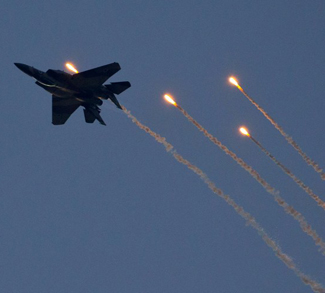Summary
Syria announced last week the existence of backchannel peace negotiations with Israel. This unexpected announcement reflects Syria’s strategic intent to be seen to be moderating, rather than the achievement of peace itself. Israel is a willing partner in this political charade, but its domestic politics make a peace deal with it’s northeastern neighbour highly improbable.
Analysis
On April 21st, Syria’s president Bashar al-Asad, announced at a press conference (in Tehran) that he had been conducting secret peace negotiations with Israel via Norwegian and Turkish intermediaries. The bargain: Israel would relinquish the Golan Heights (a 1200 square kilometre plateau at the Northern tip of Israel, which it captured in the 1967 war) in exchange for Syria’s formal recognition of Israel, and definitive reorienting (ideologically and financially) away from Iran, Hamas, and Hizbullah.
Al-Asad’s announcement conveyed Syria’s desire to be seen to be moderating: Syria wishes to mitigate the palpable discontent of its mostly Sunni neighbours – Jordan, Saudi Arabia, Egypt and Lebanon. These countries have seen their own interests threatened by regional instability resulting from Syrian animosity towards Israel, its support for Hamas and Hizbullah, and its close alliance with Shiite Iran. Indeed, the discontent of Syria’s neighbours evidenced itself as a widespread boycott of the Damascus summit held this past March.
Beyond appearances, Syria has little strategic incentive to conclude peace with Israel. Rather, the strategic priority of al-Asad is in retaining control over Lebanon. Not nearly as popular as his dead father, al-Asad realizes his authoritarian grip on power in Syria might not survive the loss of Lebanon. Thus, Syrian policy has been aggressive in support of pro-Syrian factions in Lebanon, and against the anti-Syrian opposition. To this end, Syria is desperate to squelch the UN-led inquiry into the assassination of Lebanon’s former prime minister, Rafik Hariri – once the most prominent anti-Syrian leader in Lebanon. Peace with Israel would mean allowing for the UN’s inquiry (and the condemnation of Syria as a guilty party), and in all likelihood the loss of Lebanon. Far from accepting this fate, Syria will remain a close ally of Iran, united against Western “interference” in Lebanese and Syrian affairs. Moreover, Syria would be especially foolish to abandon Iran now, as Iran is poised to become the region’s sole nuclear power, and with America likely withdrawing from Iraq within the next two years.
Israel’s participation, secret or otherwise, in peace negotiations with Syria is consistent with its longstanding official policy: trading the Golan Heights for peace. However, Israeli Prime Minister Ehud Olmert has precious little domestic political capital, having lost the 2006 war against Hizbullah (in Lebanon). His government would likely dissolve were it to take on the pro-settler parties; and there is little public support for removing the 17,000 or so Jewish residents of the Golan Heights, or for disturbing the status quo with Syria, which has been grudging but peaceful since 1974. Finally, no concerted American pressure exists to push negotiations to their conclusion: Bush is a lame-duck president, and American media attention is divided between Iraq, the economy, and the upcoming Presidential elections.
An Israeli-Syrian peace treaty is extremely unlikely for at least the next three years.
Ian Speigel is a contributor to Geopoliticalmonitor.com



